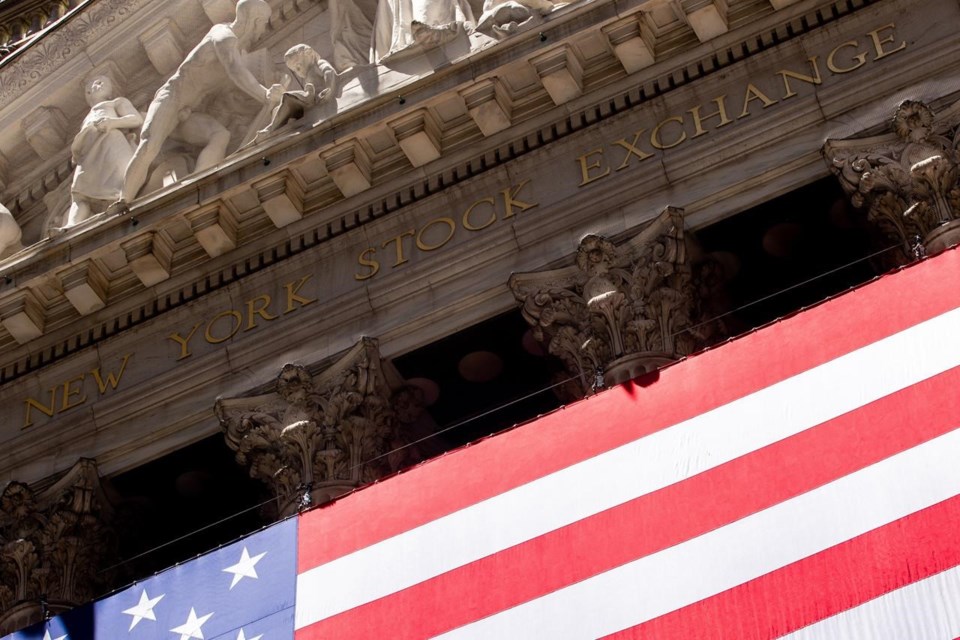NEW YORK (AP) — Stocks slipped Wednesday, as Wall Street braced for a highly anticipated report on inflation that's on the way.
The S&P 500 fell 31.67, or 0.7%, to 4,467.71 for its sixth drop in the last seven days. The Dow Jones Industrial Average lost 191.13, or 0.5%, to 35,123.36, and the Nasdaq composite sank 162.31, or 1.2%, to 13,722.02 as Big Tech stocks led the declines.
Stocks have cooled in August since soaring 19.5% through the first seven months of the year. Several reasons are behind the mini-pullback, including criticism that Wall Street too quickly formed a consensus that inflation will keep cooling, the economy will keep growing and the Federal Reserve has already finished its hikes to interest rates.
A report on Thursday will offer a big clue on how warranted those hopes are. The U.S. government will give the latest monthly update on inflation that consumers are feeling across the country, and economists expect to see an acceleration to 3.3% in July from 3% in June.
Such a reading would be down sharply from its peak of more than 9% last summer, but economists say the last bit of improvement to get inflation down to the Fed’s 2% target may be the toughest part.
Fed officials have said repeatedly recently that their upcoming decisions on interest rates will depend on what the data tells them, and they've pointed to reports on inflation and the job market in particular.
“With risks turning increasingly two-sided, Fed officials are beginning to shift the focus toward how long to hold rates steady at sufficiently restrictive levels,” according to economists at Deutsche Bank.
A reading on Thursday that’s much worse than expected could raise fears that the Fed’s job in battling inflation is far from done and that it may have to keep hiking interest rates. At the least, it could push the Fed to keep rates high for longer than expected.
High rates slow inflation by grinding down the entire economy and hurting investment prices. The Fed has already pulled its federal funds rate to the highest level in more than two decades. With rate hikes historically taking a long time to take full effect across the economy, the risk of a recession still remains.
In the meantime, companies continue to offer profit reports for the spring that are mostly better than analysts expected.
Axon Enterprise, the company behind Tasers and Axon body cameras, jumped 14.1% for the biggest gain in the S&P 500. It reported much stronger profit for the spring than analysts expected.
Akamai Technologies also helped to lead the market after beating forecasts for both profit and revenue. Its stock rose 8.5%.
Outside of earnings, Penn Entertainment jumped 9.1% after the company said it's paying $1.5 billion for the exclusive rights to re-brand its sports-betting app with the ESPN name.
On the losing end of Wall Street was Lyft, which skidded 10%. The ride-share company reported better results for the latest quarter than expected, and its forecasts for the current quarter also topped forecasts. But analysts highlighted some cautious comments from the company for expectations for the end of the year.
WeWork plunged 38.6% to 13 cents after saying there's substantial doubt about its ability to stay in business as it burns through cash. The workspace-sharing company has already had a couple spectacular rises and falls in its history, and it reported a larger loss for the spring than expected.
Nvidia was the heaviest weight on the S&P 500, falling 4.7%. The chipmaker is one of the stocks that have rocketed this year due to Wall Street's frenzy around artificial-intelligence technology, raising fears that they went too far.
Other Big Tech stocks also fell, and their movements pack more punch on the S&P 500 because of their massive size. Amazon sank 1.5%, Microsoft fell 1.2% and Tesla dropped 3%. The threat of high rates tends to hit technology and other high-growth stocks the hardest.
In the bond market, the yield on the 10-year Treasury slipped to 4.00% from 4.03% late Tuesday. That yield helps set rates for mortgages and other loans.
The two-year Treasury yield, which moves more on expectations for action by the Fed, rose to 4.80% from 4.76%.
In stock markets abroad, indexes were modestly higher in Europe and mixed in Asia. A report showed that prices at the consumer level in China were lower in July than a year earlier.
China was supposed to help prop up the global economy after it removed anti-COVID restrictions, but its recovery has fallen short of expectations. The weakness, though, has also kept some pressure off inflation around the rest of the world.
——
AP Business Writers Yuri Kageyama and Matt Ott contributed.
Stan Choe, The Associated Press

